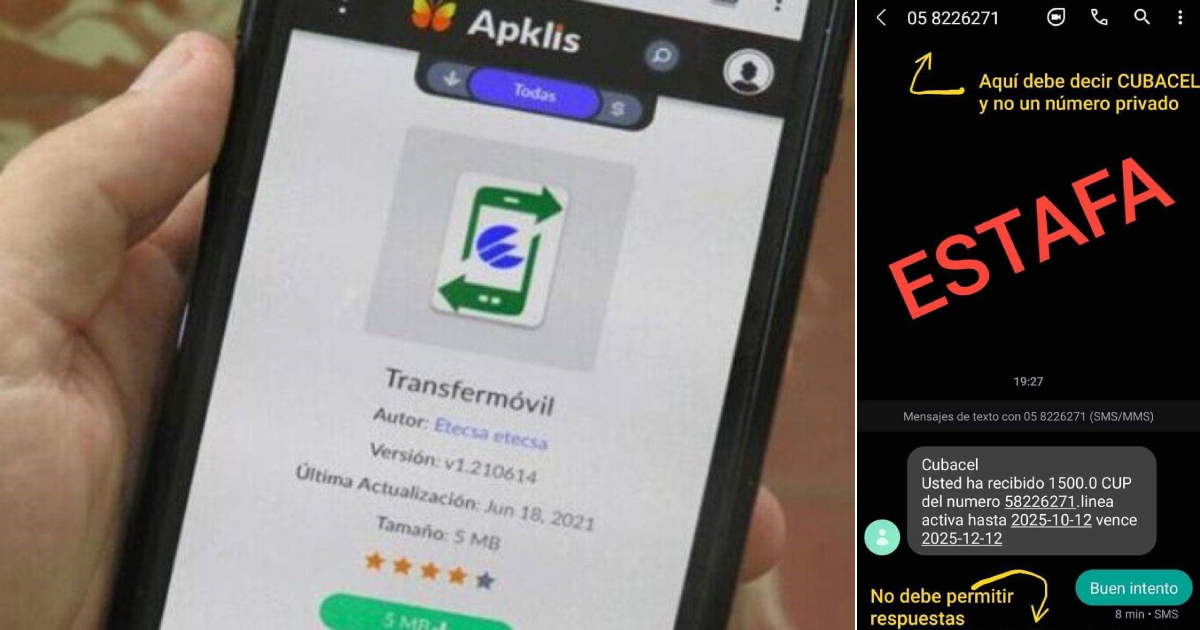
Transfermóvil, the electronic payment application via cell phones in Cuba, issued a warning about the rise of a scam that simulates a recharge or mistaken transfer of balance to a mobile phone, and then asks the supposed recipient for the return of the money.
"Attention everyone, lately it has been reported that certain individuals are sending SMS messages mimicking the ones that come from Cubacel by default, when a mobile recharge or balance transfer is received, and then they call people to persuade them by claiming it was a mistake and that they need them to return the money. This is completely false," warned the Transfermóvil statement.
The announcement was disseminated through the app's Telegram channel and has also been shared by profiles of state institutions, including banking entities.
Scammers make victims believe that a supposed amount of money was transferred to them by mistake and try to convince them to return it.
Users who have reported this type of scam claim that authorities do not act when they receive the complaint, noted the website TecnologíaCuba, which echoed the recent alert from Transfermóvil.
According to the note, in the group associated with the Telegram channel, a user of the application commented that "something should be done about those scammers, the company has their information and can send it to the police."
A report from the official newspaper 26, from Las Tunas, gathered testimonies from people who were attempted to be scammed through this method, which has become recurrent in the country.
"Have you ever received an SMS about a supposed recharge or transfer and then someone calls you explaining that they made a mistake transferring the balance and asking you to return the money?" was the question the newspaper asked its readers.
A man revealed that someone tried to scam his mother in that way, and they sent her "a text message saying that they had made a mistake, that they had transferred 500 pesos (...); they should be careful with this type of person."
Another reader commented that they also tried to scam his daughter "like that, even claiming they were in the hospital and that it was an urgent necessity for them to return at least 100 pesos." However, the man acted immediately: "First, I checked the balance and obviously, they hadn't transferred anything, and then I saw that it wasn't ETECSA who had sent the message. And I realized it was just one of many scams."
The state-owned Empresa de Telecomunicaciones de Cuba S.A. (ETECSA) has previously insisted that if a person receives a message about a supposed erroneous transaction, they should check the last 10 operations carried out via Transfermóvil or Enzona to verify that they indeed deposited the money into their bank account or into their mobile balance.
To avoid this type of scam, Transfermóvil also warns that "service SMS are not identified by private (personal) numbers and cannot be replied to (...); they are always in the name of Pago por Móvil," the newspaper points out.
It is important for the holders of telephone lines to be clear about how much balance they have, or otherwise, to check it before making any transfer.
As an additional precaution, experts recommend that Transfermóvil users block the number of the person, “if they receive this type of message from a private number.”
ETECSA also recommends avoiding opening attachments from suspicious sources, completing forms, sharing dubious links, and responding to emails from unknown senders, as “those malicious programs can generate calls, text messages, and connections automatically.”
According to the tunero newspaper, the population must be alert to other possible types of scams, as scammers have even gone so far as to spread supposed offers of gifts or misleading advertisements from fake pages or profiles.
A false raffle was also promoted for International Women's Day, which required providing an email address to notify how to receive the prize. During the registration process for the raffle, individuals "appropriated other personal data that they later used to steal digital money from their victims."
Recently, ETECSA has warned customers about attempts at scams involving false money transfers, due to the increase in cases of alleged monetary transactions mistakenly made through the Transfermóvil application.
In January, a Cuban shared a video on Facebook showing a "scam attempt recorded in real time" during an MLC transaction via Transfermóvil.
What do you think?
COMMENTFiled under: